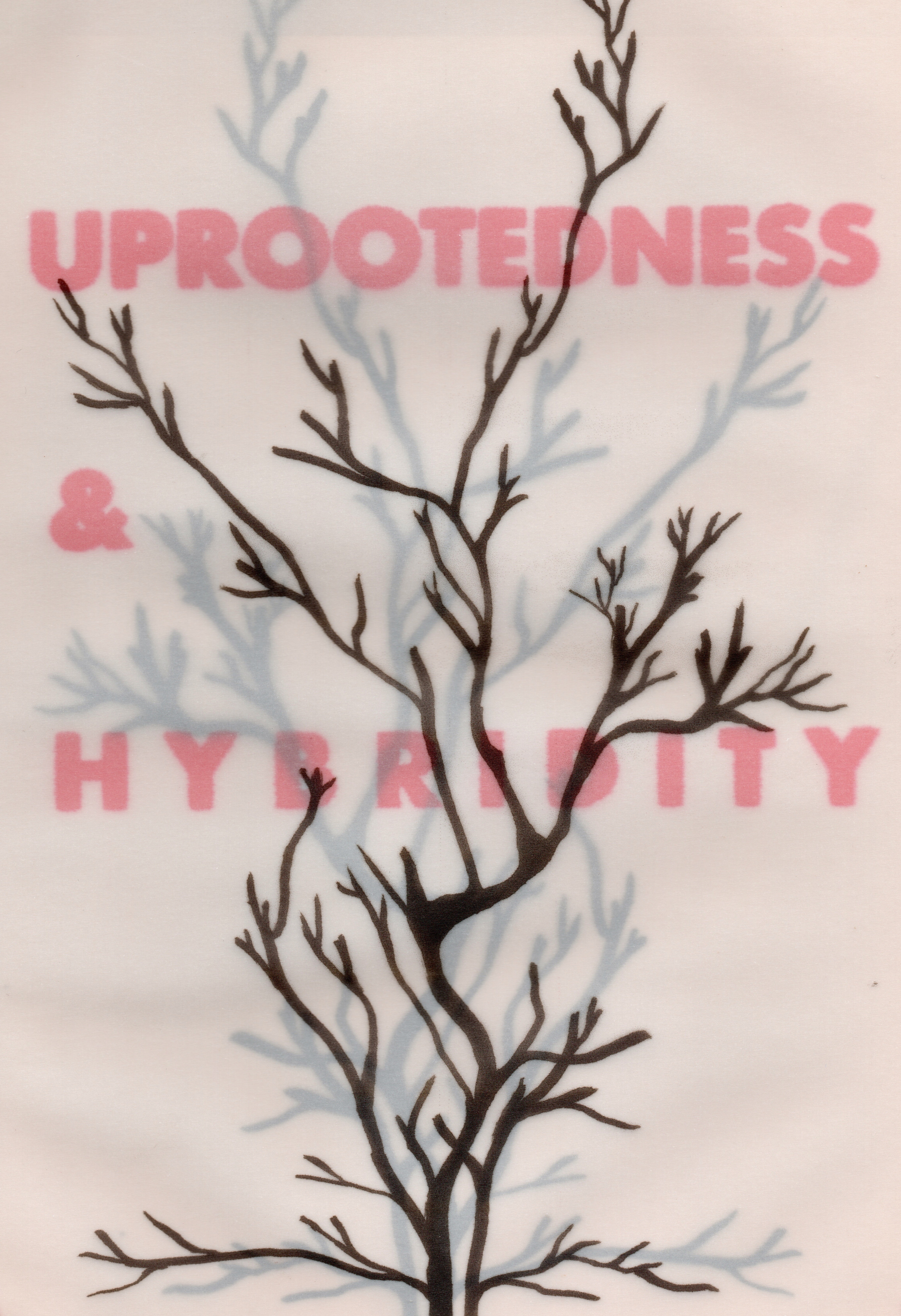
Monika Dorniak – Uprootedness & Hybridity, 2021, Seminar poster
The interdisciplinary seminar series Uprootedness & Hybridity (2021) depicts intergenerational trauma in Eastern Europe and Latin America through art, poetry, theatre and medical anthropology. The short presentations encompass contributions from different backgrounds that aim to deliver a multilayered perspective on the complex subject. The first seminar taking place in June 2021 reflected on Eastern Europe, while the follow up seminar focused on Latin America.
Supported by Counterpoints Arts UK.
Duration: 2 x 120 min.
Presented at Refugee Week UK and Platforma Festival (2021)
The interdisciplinary seminar series Uprootedness & Hybridity (2021) depicts intergenerational trauma in Eastern Europe and Latin America through art, poetry, theatre and medical anthropology. The short presentations encompass contributions from different backgrounds that aim to deliver a multilayered perspective on the complex subject. The first seminar taking place in June 2021 reflected on Eastern Europe, while the follow up seminar focused on Latin America.
Supported by Counterpoints Arts UK.
Duration: 2 x 120 min.
Presented at Refugee Week UK and Platforma Festival (2021)
Uprootedness & Hybridity: Researching Eastern-European intergenerational trauma in the arts and theatre
Our bodies store memories that far exceed our lifetimes, and the global increase in migrations and forced displacements leads us to new reflections on our belonging and identity. In the past decades, artists, scientists and historians have become increasingly interested in the research of intergenerational trauma, and the impact of our ancestors traumatic experiences on our present identities. Wars do not only deconstruct landscapes and bodies, but destroy cultural archives and artefacts, which leave descendants with no less than fragmented images of their bygone ‘realities’.This seminar introduced artistic quests across Eastern European history from four different perspectives. While sharing our personal and intimate reflections, we are unravelling the complexity of intergenerational trauma collectively, and allow space for different questions that may lead us to new answers.
Transmission of trauma is not limited to genes only, but could also be experienced through its reenactment in the arts and theatre.In our seminar, Ukrainian historian and theatre maker Olesya Khromeychuk describes the ongoing war in Donbas, and introduces three documentary plays, based on war testimonies of witnesses or participants.
The traumatic events of the Shoah and their impact on the Jewish culture are a major theme for British artist Jessica Ostrowicz, whose sculptural works introduce healing rituals and repetitions.
In their lecture performance German-Polish artists Monika Dorniak and Susanna Rydz analyse hybridity, othering, and their ancestors experience of oppression.
New York-based curator Nina Mdivani talks about the impact of the multiple Russian invasions of Georgia in the 20th century on cultural and artistic processes, and questions how art can reflect historical meaning-making and victimhood by bridging fiction and reality.T
he lectures conclude with a group discussion that was s open to the audience. The seminar ends with a healing workshop by The Red Zenith Collective.
An online seminar presented by Monika Dorniak.
Commissioned by Counterpoints Arts for Refugee Week 2021.
With contributions by Monika Dorniak & Susanna Rydz, Olesya Khromeychuk, Nina Mdivani, Jessica Ostrowicz, Red Zenith Collective.
Uprootedness & Hybridity: Exploring intergenerational trauma in Central and Latin America through art and anthropology
Following on from our first seminar in this series (June 2021), in the second seminar of this series we analyse parallels between Central America and Eastern Europe, and reflect the global impact of intergenerational trauma on our generations. We unravel the complexity of the subject collectively, and provide space for the participants questions and comments in our group discussion.
As a brief introduction, interdisciplinary German-Polish artist and moderator Monika Dorniak introduces Marianne Hirsch’s concept of ‘postmemory’. Inherited memory can both form our identity and hinder us from being in the present – what is the balance in working with our ambiguous roots as artists and researchers?
Next, Jessica P. Cerdeña, MD/PhD candidate in Medical Anthropology at Yale University, explores how the legacies of colonisation, enslavement, migration-related trauma, and ongoing structural violence shape the lives and memories of Latinx people today. This discussion centres on the literature surrounding intergenerational trauma in Latinx communities, the narratives of Latin American migrant mothers living in southern Connecticut, and tactics of resistance and imperative resilience to cope with and heal from generational wounds.
Indigenous cyberfeminist, scholar and artist Dr. Tiara Roxanne examines intergenerational trauma in regards to storytelling for Indigenous peoples. In her talk the Berlin-based artist will discuss her artistic concepts of body memory and decolonial gestures, and present a selection of examples from her multi-medial artistic practice.
Mexico-based Ukrainian art historian, artist, and curator Svitlana Biedarieva analyses intergenerational trauma as reflected in the work of contemporary artists in Ukraine and Mexico, and discusses parallels between Mexican and Ukrainian art based on the topics of conflict, displacement, and insecurity. The rationale for the comparison is the exploration of how discrepant geographies can be united by postcolonial experience of the countries in question, and how this experience fosters elaboration of a cultural product that reflects on the conflicts caused by global divisions of power as well as local social hierarchies.
Argentinian, Berlin-based multi-media artist Eliana Sola Bussas finishes the seminar by performing a selection of poems that were written by her grandmother Ofelia Castillo in Brazil. The poems were written during Castillo’s time in exile between 1979 to 1983, when the ‘Guerra sucia’ (English: Dirty War) shook the Argentinians.
An online seminar presented by Monika Dorniak.
Commissioned by Counterpoints Arts for Platforma 6.
Featuring contributions by Jessica P. Cerdeña, Tiara Roxanne, Svitlana Biedarieva, Eliana Sola Bussas.
Commissioned by Counterpoints Arts for Platforma 6.
Featuring contributions by Jessica P. Cerdeña, Tiara Roxanne, Svitlana Biedarieva, Eliana Sola Bussas.
︎ You may scroll down to view more works ︎
All images and texts © 2023 Studio Monika Dorniak
All rights reserved
All rights reserved